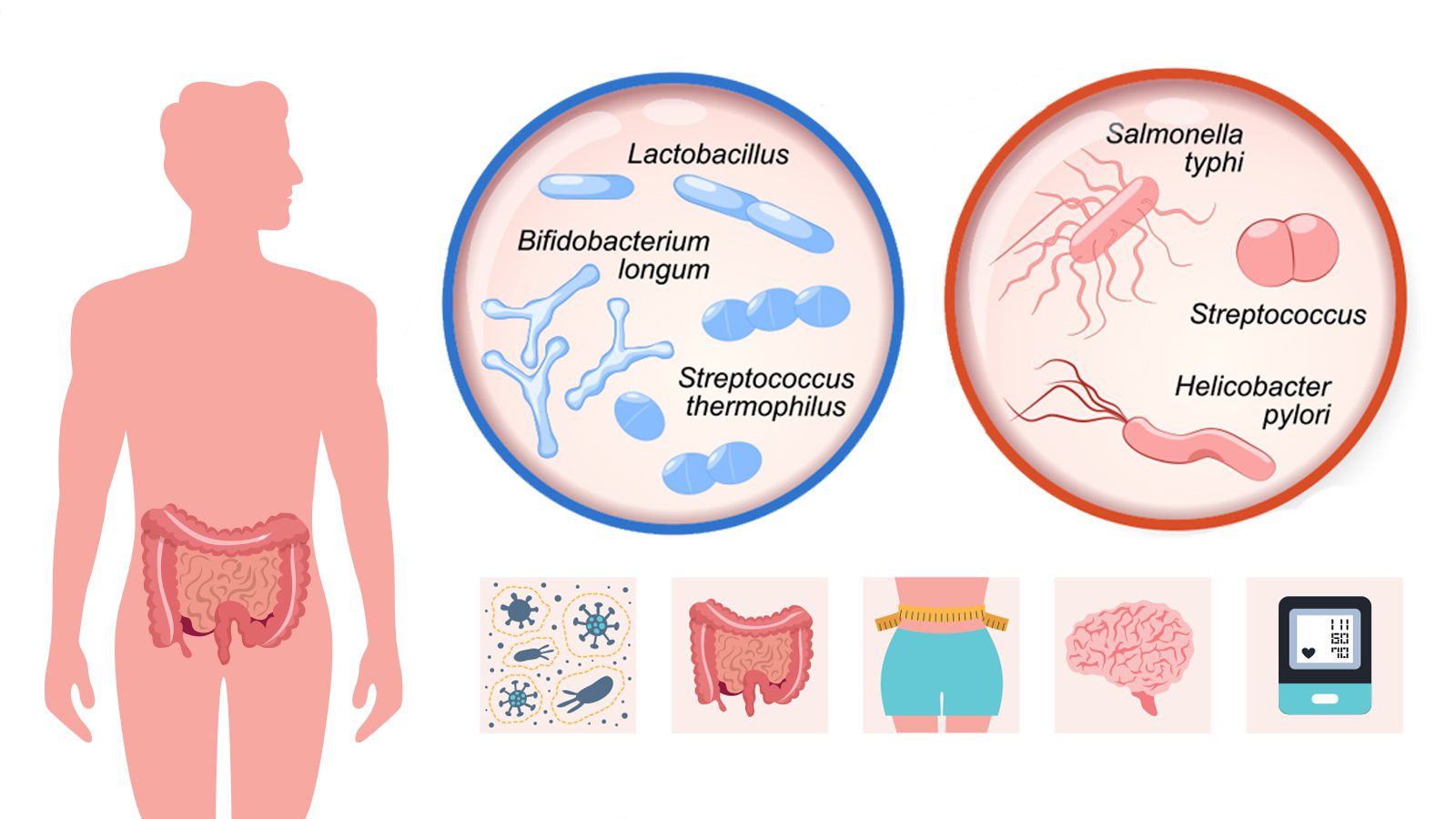Over the years, probiotics have become a household word. This “good” bacteria can benefit some people, but they aren’t helpful in all situations. Probiotics aren’t medicine. They’re a natural supplement found in many foods. It’s essential to understand the difference when taking them for gut health. Here is what scientists suggest happens to your body when you take probiotics every day.
What are probiotics?
Probiotics are a combination of live yeast and bacteria in your body. They’re considered the ‘good bacteria which keep your gut healthier and boost your immune system. Probiotics are part of the microbiome, a group of organisms made up of microbes that live together in and on your body, keeping it healthy. Microbes in your lower intestines digest your food, fight off bacteria and keep you regulated. When these microbes get off balance, it leads to health problems.
What are the health benefits of probiotics?

Researchers are still learning the health benefits of probiotics and who benefits the most from taking them. Probiotics may help treat people who have these health conditions, including:
- Antibiotic-resistant diarrhea
- Inflammatory bowel disease
- Irritable bowel disease
- Hypercholesterolemia
- Obesity
- Atopic dermatitis
- Pediatric acute infectious diarrhea
- Gastro symptoms like gas, bloating, and constipation, especially in older people.
Studies show that taking a probiotic while on an antibiotic may help you avoid diarrhea. Researchers are still unsure whether probiotics help healthy individuals.
When choosing a probiotic to improve your gut health, what do you need to know?
There are so many probiotics on the market that it’s hard to know which ones live up to their claims. Many probiotics get destroyed by your stomach acids even before reaching your digestive tract. So, consider these things when you buy a probiotic.
- Shelf-stable: Make sure the probiotic supplement is shelf-stable. Probiotics shouldn’t need to be refrigerated, and they should last at least two years.
- Soil-based organisms: Your probiotic should be soil-based.
- Strain varieties: Choose a probiotic at least ten probiotic strains. These include the following: Lactobacillus acidophilus, Bacillus coagulans, Streptococcus thermophilus, Bifidobacterium strains.
- A high number of probiotics: Your probiotic should have at least 50 billion probiotics per serving.
- Delay release: Choose a delayed-release capsule that protects the probiotics from stomach acids.
- Prebiotic included: Choose a probiotic with prebiotics included in the supplement’s formula.
What foods are natural probiotics?
There are many foods loaded with probiotic cultures for good gut health. Today, people understand that it’s best to get their nutrients from healthy foods rather than supplements to meet their dietary needs. If you want to be sure to get enough probiotics in your system, these are some excellent foods with natural probiotics.
1 -Dark chocolate
Dark chocolate is packed with antioxidants and anti-inflammatory properties that are good for your gut. Be sure to choose dark chocolate with at least 70% cacao for the best source of prebiotics and probiotics.
2 – Greek yogurt
Greek yogurt is rich in probiotics. It has two strains of bacteria that restore your gut health. Some people say that eating yogurt regularly helps repair your gut to the right balance of good bacteria if you’re on antibiotics. Be sure the label on the Greek yogurt you choose says live active culture for the best results.
3 – Sauerkraut
Sauerkraut is a cabbage fermented with lactic acid rather than vinegar. Thus, it delivers the most probiotic benefits. Sauerkraut contains fiber, vitamins K, B, C and iron. When you buy sauerkraut, ensure it’s unpasteurized and fermented with lactic acid. Buy it fresh rather than on the shelf in a can.
4 – Kimchi
Kimchi is a spicy Korean dish made from fresh cabbage and vegetables fermented in lactic acid bacteria. This spicy side dish boosts your gut health, similar to sauerkraut. Kimchi comes either pasteurized or unpasteurized. You’ll find the best benefits in unpasteurized kimchi with live active cultures. Buy fresh kimchi at the market or make your kimchi to guarantee it’s new.
5 – Kombucha
Fizzy and fermented and made with drinks like black or green tea, kombucha has grown in popularity over the past few years. It’s not a cure-all, but many people have experienced health benefits from this probiotic blend. Be sure to buy an authentic kombucha, not a kombucha-type drink. There are many copycats, so read the label to see if the drink contains lactic acid.
6 – Kefir
Kefir is a dairy with probiotics. Even if you’re lactose intolerant, you should be able to drink kefir. It’s made from lactic acid, yeast, and bacteria. It’s thought that drinking kefir will improve your gut and bone health and help fight infections. Be sure to read the label to guarantee you’re getting genuine kefir and not an imitation drink.

7 – Pickles
If you like to eat dill pickles, you’re getting natural probiotics. Made from cucumbers fermented in their lactic acid, pickles contain good bacteria and salt, and water. Pickles are sour probiotic snacks. You should choose the type of pickle in the refrigerator section of your grocery. These contain lactic acid. Conversely, food manufacturers make shelf pickles with vinegar, not lactic acid.
8 – Tempeh
Tempeh is fermented soybeans made into a loaf or patty. Thus, it works for people who enjoy a plant-based diet. It’s high in protein and a great source of probiotics, calcium, and protein. Be sure to buy fresh tempeh for the best health benefits and taste.
Probiotic risks
There is a wide assortment of probiotics currently on the market. The FDA does not regulate most supplements. Because of this, it’s hard to know what’s inside many of these supplements. There is a risk of taking these probiotics because of the unknown ingredients that could make you sick. Beware of probiotics from other countries, especially those countries that don’t have the same medical standards as the United States.
A second risk is that many people assume probiotics are like medication instead of supplements. The lack of quality of some of these probiotics that promise to cure you of certain health conditions could be dangerous. Many of these probiotics don’t list the ingredients or disguise them. Studies show that unregulated probiotics may transfer a plasmid-mediated antibiotic resistance to your gut, especially in certain at-risk groups. Researchers suggest you use discretion when choosing a probiotic that may not have FDA approval and could cause more harm than good. Generally, it’s best to get your nutrients from eating healthy foods rather than taking supplements.
Misuse of probiotics can kill you.
It may sound dramatic to say probiotics can kill, but it can happen–rarely. People with serious medical conditions like severe infections should avoid probiotics. Probiotics are harmful to these individuals. There have been cases where probiotics led to sepsis in people who are:
- Post-operative patients
- Infants with serious illnesses
- Elderly patients
- Immunocompromised patients
- Cancer patients on immunotherapy inhibitors-Avoid taking them since they lower your chances of remission.
- Babies: Probiotics aren’t safe for babies, especially preemies, since their immune systems are still developing.
Individuals in the ICU who take probiotics can develop bacteremia or fungemia, two deadly infections. The risk is incredibly high if they have a catheter. Sepsis can spread to other patients in the room through the air, hand contact, or objects and utensils used by the medical staff.
Two common probiotics that can kill high-risk people include the following:
- Saccharomyces: This yeast causes fungemia in the person who took the probiotic and those around them. Most of these cases happen in intensive care units in hospitals.
- Bifidobacterium: These bacteria cause invasive infections and even sepsis in people with low immune system function. It’s essential to understand a person’s health status before giving them probiotics. You could cause them a severe or even deadly infection.
Should you take probiotics every day?
Whether it’s healthy to take probiotic supplements every day for gut health. Probiotics are safe for most people, but it’s probably better to skip them if you fall into specific categories. Even if you’re healthy, sometimes probiotics can cause side effects such as
- Gas
- Bloating
- Diarrhea
- Upset stomach
Once you get used to them, your system settles down, and the side effects will go away. Most importantly, is t at before you give probiotics to someone, be sure you understand their health conditions. Generally, unless your doctor prescribes probiotic supplements, it’s best to get your probiotics from a well-balanced diet that includes foods that naturally have probiotics. Your digestive system functions quite well, so there’s no need for daily probiotic supplements.
Final thoughts on understanding how probiotics help your gut health–and who should avoid them
Today, people understand that the best way to stay healthy isn’t to take great supplements, but to eat healthy, natural foods, including those with natural probiotics.
If you want to receive the many benefits of probiotics, choose fermented vegetables such as kimchi or sauerkraut or fermented dairy foods like kefir for probiotic health in your gut. Hopefully, this article helps you answer whether it’s healthy for you to take probiotics every day or if you should look for ways to get them in your diet.





















